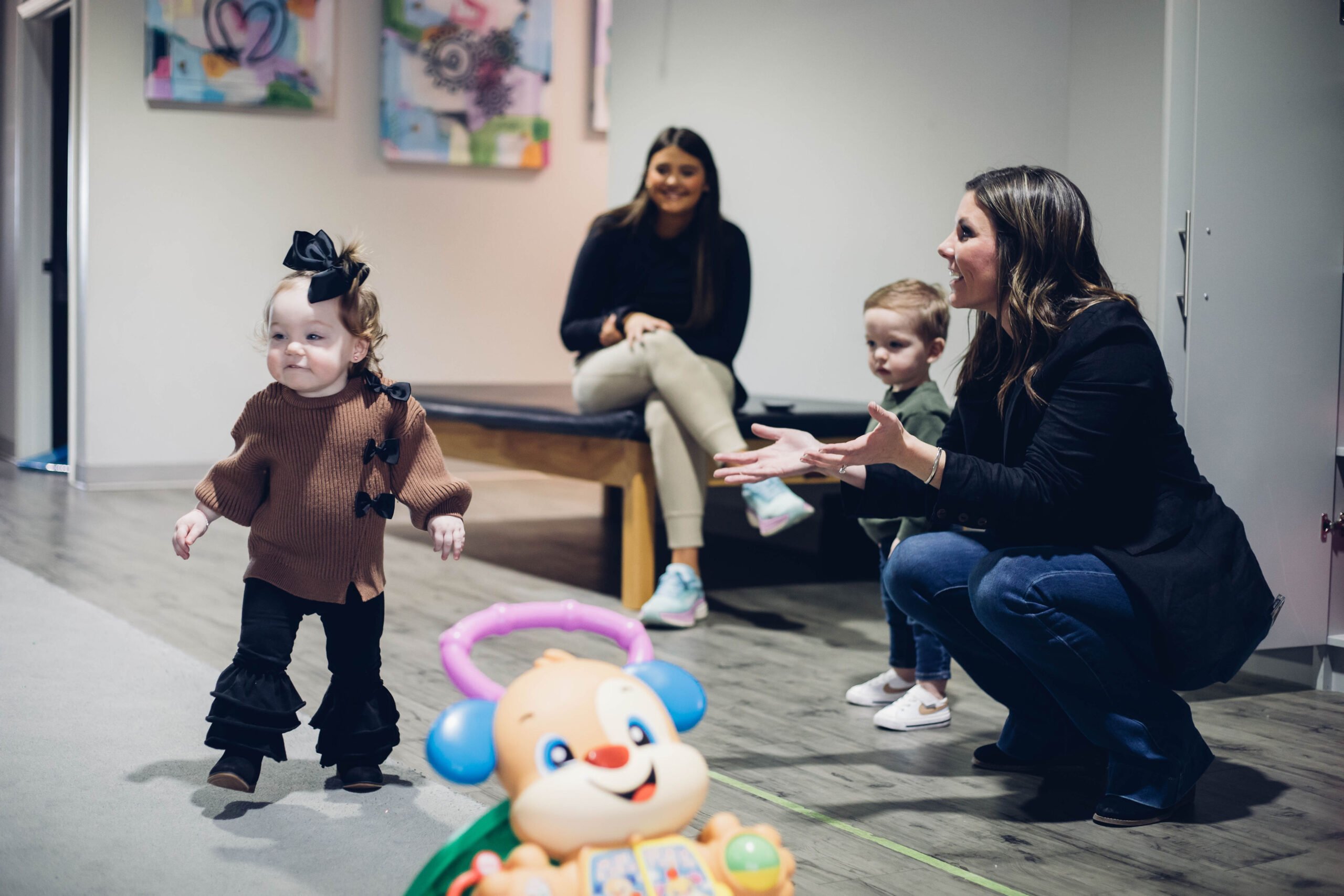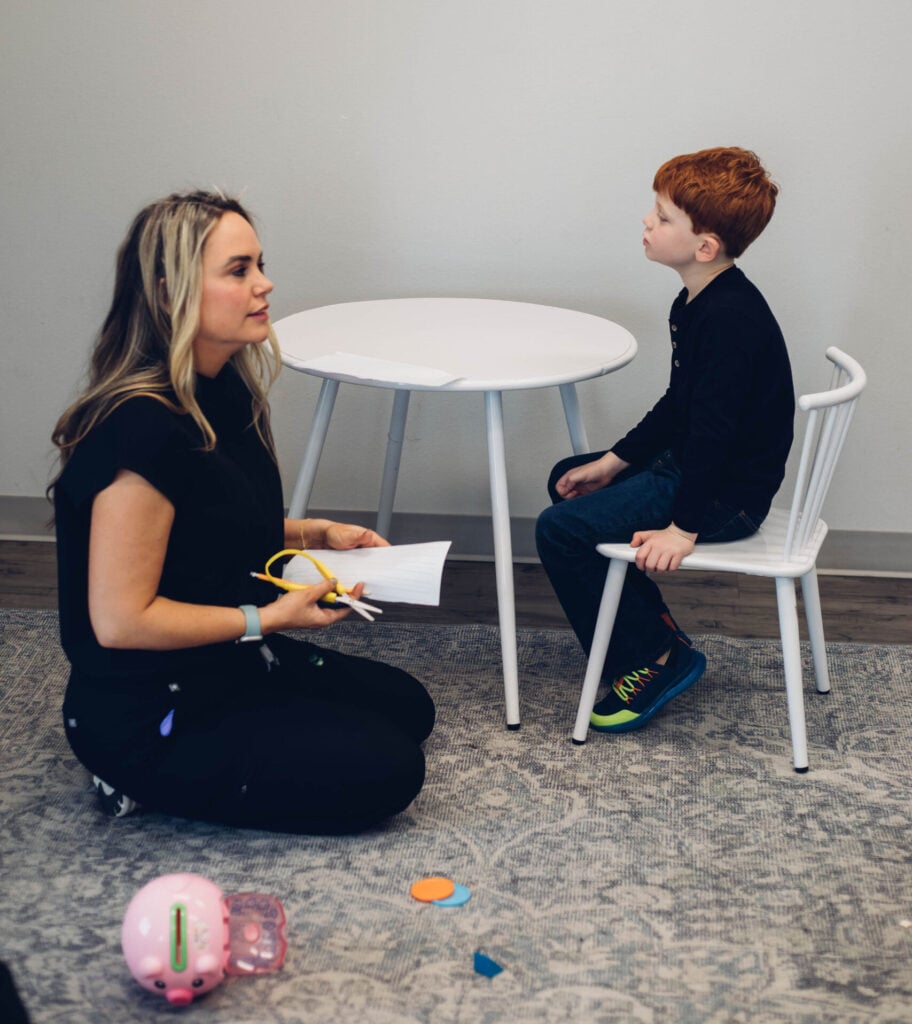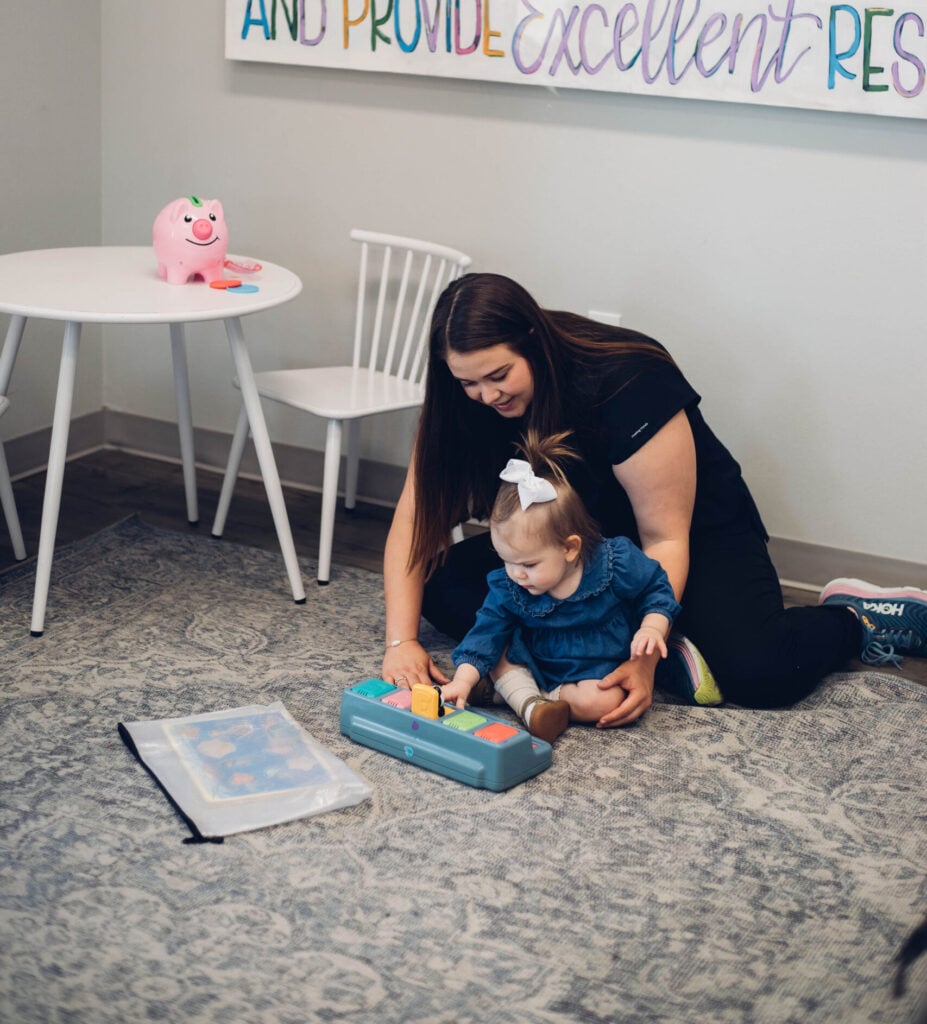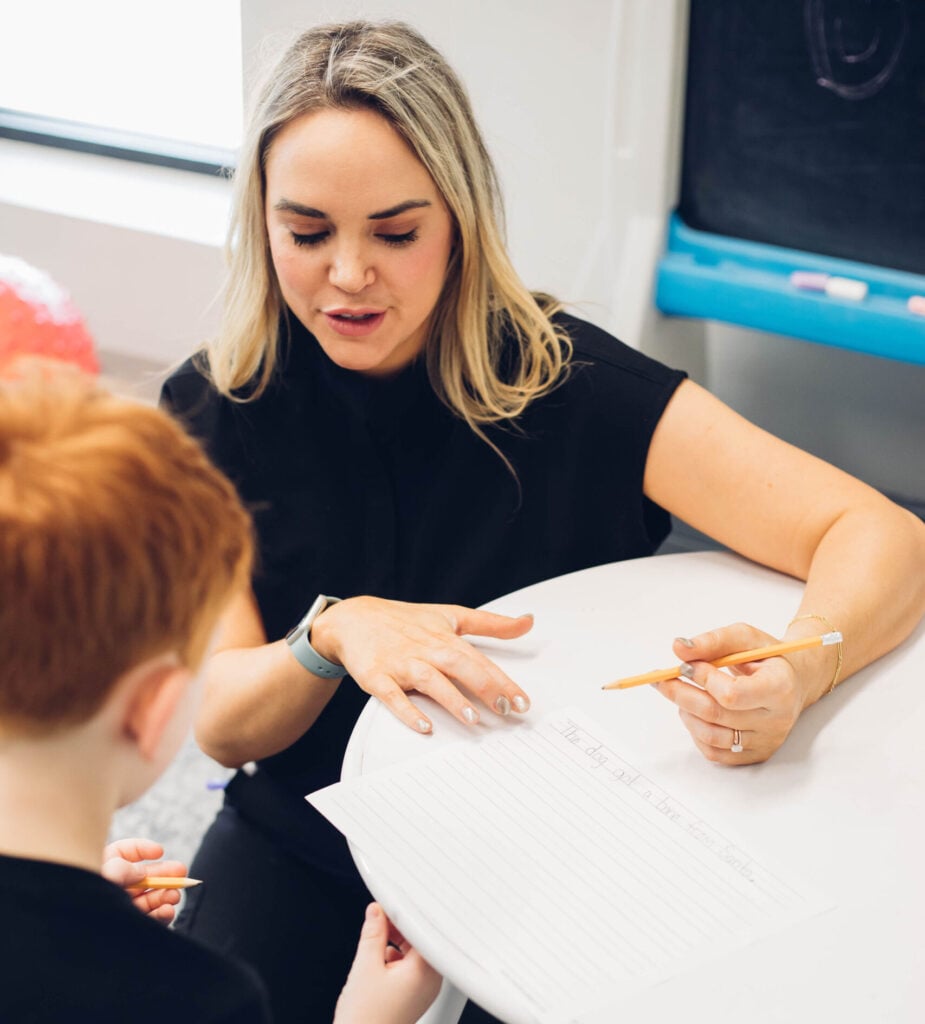
One of the most important skills for success in life is the ability to communicate. This involves both sharing your thoughts and feelings in a way that others can understand and being able to understand what other people are saying to you. For children with speech and language difficulties, communicating effectively can be hard. At Pediatric Therapy Partners, our goal is to help children develop the speech and language skills they need to be successful, independent, and maintain good relationships their whole life.
Does My Child Need Speech Therapy?

It’s natural to worry about your child’s speech and language development. The good news is there is something you can do about it! If your child is behind on their developmental milestones, you can call us at (318) 746-1199 and ask about our free developmental screening. Our therapists will be happy to go over your child’s difficulties and advise you if speech and language therapy will benefit them.
The following are signs that your child may benefit from speech therapy:
- Difficulty completing tasks.
- Difficulty communicating their needs and wants.
- They have a cleft lip, palate, or other physical condition that inhibits their speech.
- They struggle to pronounce certain sounds or stutter.
- They have autism.
- They have a learning disorder or developmental delays.
- They have a genetic condition like Down syndrome.
- They’ve suffered from a traumatic brain injury.
What Is a Speech Therapy Session Like?
Our speech and language pathologists will work with your child to help them develop the skills they need to be able to effectively communicate. Many of the activities and exercises we do will look and feel like playtime, and that’s the point! We want your child to enjoy their therapy sessions because when they’re having fun, they’re more willing to keep trying!
The activities our therapists will do with your child are specifically chosen to target their needs, goals and interests. Some of these activities may be practicing certain sounds, games to improve cognition and social skills, storytelling, and memory games. We also model the correct pronunciation and behavior for children because much of learning comes from mimicking what we see around us.
With routine therapy sessions, lots of practice at our clinic and at home, and lots of encouragement, your child will improve their communication skills. This will help them become more confident not only in talking to friends and family but also in understanding what others are asking of them in daily life. These skills are important for interpersonal relationships, school, work, and all of life — and they can be learned and improved!

How Do I Schedule a Speech Therapy Evaluation?

Our pediatric speech therapists will need a referral from your child’s pediatrician to evaluate and treat your child. If you don’t have one, don’t worry! Our staff can help coordinate this and get you a referral so your child can receive treatment.
When you’re ready to make an appointment for your child, call our office at (318) 746-1199 to speak to our Intake Coordinator. She will be able to answer your questions, and she will send you an email with online forms to fill out.
Once you have completely filled out the forms, including your insurance information, our Intake Coordinator will contact you to schedule your child’s initial evaluation appointment and go over any other important details with you.
Ready to get started? Call us at (318) 746-1199 today!
I cannot say enough good things about PTP Shreveport! Not only have both of my boys improved with HUGE strides in their speech, but they feel so LOVED each and every visit! I would recommend PTP again and again to anyone needing therapy for their little ones.
We have been coming here for my 20 month old to get speech therapy. They have been so patient and amazing with him. Every single staff member I’ve interacted with has been incredibly kind and helpful. Cannot recommend them enough!
Pediatric Speech Therapy Frequently Asked Questions
How would I know my child needs speech therapy?
It’s natural for parents to wonder if their child could benefit from speech therapy. Some signs that might indicate a need for pediatric speech therapy:
- Articulation Challenges: If your child has difficulty pronouncing certain sounds, makes frequent speech errors, or is hard to understand, speech therapy might help improve their clarity.
- Limited Vocabulary or Expressive Language: If your child has a smaller vocabulary compared to peers of the same age, struggles to put words together to form sentences, or has trouble expressing thoughts clearly, speech therapy could support their language development.
- Difficulty Understanding: If your child has trouble understanding spoken language, following instructions, or responding appropriately to questions, speech therapy might aid in enhancing their receptive language skills.
- Stuttering or Fluency Challenges: If your child experiences frequent interruptions in their speech flow, repeats sounds or words, or seems to struggle with fluent speech, speech therapy can address fluency challenges.
- Social Communication Challenges: If your child has difficulty engaging in conversations, understanding nonverbal cues, or using appropriate social language, speech therapy can help them develop effective communication skills.
- Reading and Writing Challenges: If your child struggles with phonics, letter sounds, or reading comprehension, speech therapy can also contribute to improving their literacy skills.
Remember that every child is unique, and some mild speech variations might be part of typical development. However, if you notice persistent challenges in communication that affect your child’s interactions and learning, consulting with a speech-language pathologist can provide insights into whether speech therapy is a suitable step to enhance their communication abilities.
What are types of “Why” questions important in pediatric speech therapy?
In pediatric speech therapy, “why” questions are a valuable tool to develop language and reasoning skills. Using “why” questions, speech therapists can enhance a child’s ability to express themselves, reason, and engage in meaningful conversations. Some common types of “why” questions include:
- Cause and Effect: These questions encourage children to understand the reasons behind actions or events. For example, “Why do we wear coats in winter?”
- Inference: These questions help children infer information based on context. For instance, “Why might a person carry an umbrella on a rainy day?”
- Predictive: Predictive questions prompt children to anticipate outcomes. For example, “Why do you think the ice cream will melt if left in the sun?”
- Problem-Solving: These questions stimulate critical thinking. For instance, “Why would you need a flashlight during a power outage?”
- Comparative: These questions involve comparing situations. For example, “Why might a bicycle be a better choice than a skateboard for a long trip?”
- Emotional Understanding: These questions help children grasp emotions. For instance, “Why might someone feel happy after getting a gift?”
Tailored to each child’s developmental stage, “why” questions encourage language growth and improve cognitive skills while making learning enjoyable.
At what age should my child start speech therapy?
It can be worrisome when your child isn’t meeting developmental milestones, especially in speech and language development. There’s no clear-cut answer regarding when your child should start speech therapy since every child reaches their speech milestones at different times.
The American Speech-Language-Hearing Association (ASHA) recommends that children who struggle with speech and language development should receive an evaluation by a speech therapist by the age of 3. If you’re concerned about your child’s speech or language development, don’t hesitate to reach out to a speech therapist. Their advice can provide peace of mind and help your child achieve their full potential. The age range for speech therapy may vary but remember, early intervention is always key in helping your child succeed.
Is pediatric speech therapy covered by insurance?
Many insurance plans do cover pediatric speech therapy, but the coverage can vary. Some plans might cover a certain number of sessions per year, while others may only cover therapy for children with specific diagnoses. Contact your insurance provider to understand the specifics of your plan, including co-pays, deductibles, and any other requirements for coverage. Here’s what you can do:
Call your insurance company or check their website to find out what’s covered under your plan.
Ask if the insurance provider needs any documentation, like a doctor’s referral, to approve speech therapy.
Reach out to the speech therapy clinic you’re interested in. They often have staff who can help you navigate insurance-related questions.
By doing your research and double-checking your plan, you can avoid unwanted financial surprises. If insurance coverage isn’t available or if you have concerns about costs, talk to your child’s doctor and their speech therapy provider. Some clinics offer self-pay options, and there might be community resources or grants that can help. Don’t hesitate to reach out to the professionals involved to understand your options and make the best decision for your child’s development.
Is a referral required for my child to start speech therapy?
Getting a referral from a doctor or a healthcare professional can be a big help as your child starts their speech therapy journey. A referral offers critical information about your child’s medical history, challenges, and needs—information that guides the speech-language pathologist in creating a tailored therapy plan. In some cases, a referral is necessary. Some speech therapy clinics might accept direct appointments without a referral, while others might prefer or require one. It’s a good idea to check with the specific clinic you’re considering to understand their policy.
A referral may also be necessary if your insurance plan requires one for coverage. Don’t hesitate to reach out to both the potential speech therapy clinic and your child’s doctor for specific guidance based on your child’s unique needs and the clinic’s requirements.
